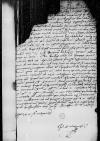Letter #1871
Ioannes DANTISCUS to [Tiedemann GIESE]Hohenstein (Olsztynek), 1538-07-12
English register:
Dantiscus left Wrocław (Breslau) on [June] 18, and on [June] 19 [Ferdinand I of Habsburg] departed for Olomouc. From [June] 27 to [July] 1, Dantiscus was in Cracow, where he dealt with the matters entrusted to him in Giese’s letter.
On [July] 4 the royal couple [Sigismund I Jagiellon and Bona Sforza] escorted the young king [Sigismund II Augustus] to Bochnia, on his way to war with the “Wallachian” [Petru IV Raresh].
Georg Hegel maintains that the bulls [of confirmation] were sent to Dantiscus and Giese on the April 9. He does not know why they are taking such a long time to arrive. Dantiscus suspects this failed delivery is the fault of Dietrich von Rheden, who wants to present them in person, but Dantiscus does not think this is to his credit.
Hegel will promptly send Dantiscus the bill that Quirinus Galler is meant to send [from Rome], and also the document on assuming administration of the bishopric that Samuel Maciejowski promised to pass on as soon as the King receives the decision of the Pope [Paul III] regarding Giese.
Returning from Cracow, Dantiscus took the shorter way through Mazowsze, which is why he did not stop for a visit.
Manuscript sources:
Prints:
| ||||||
Text & apparatus & commentary Plain text Text & commentary Text & apparatus Excerpts concerning Dantiscus' travels
[...] paper damaged⌈[...][...] paper damaged⌉ carissi paper damaged⌈[carissi]carissi paper damaged⌉me et honoran(de) or honoran(dissime)⌈honoran(de)honoran(de) or honoran(dissime)⌉.
Salutem paper damaged⌈[tem]tem paper damaged⌉ [...] paper damaged⌈[...][...] paper damaged⌉ commendationem paper damaged⌈[commendationem]commendationem paper damaged⌉ plurimam.
Sospes Deo gratia paper damaged⌈[ratia]ratia paper damaged⌉
[...] paper damaged⌈[...][...] paper damaged⌉ibus feliciter ampliusque quam ex s[...] paper damaged⌈[...][...] paper damaged⌉ [...] paper damaged⌈[...][...] paper damaged⌉ibus paulo post ex hoc satis lon[...] paper damaged⌈[...][...] paper damaged⌉s viribus, latius ingressus sum cum [...] paper damaged⌈[...][...] paper damaged⌉ magnifico domino
De bullis nostris mihi
Lucratus sum intereundum per
Quam felicissime valere cupio ex animo.
Dat(ae) or Dat(um)⌈Dat(ae)Dat(ae) or Dat(um)⌉
Reverendissimae Dominationis Vestrae frater integerrimus

 BCz, 245, p. 37
BCz, 245, p. 37